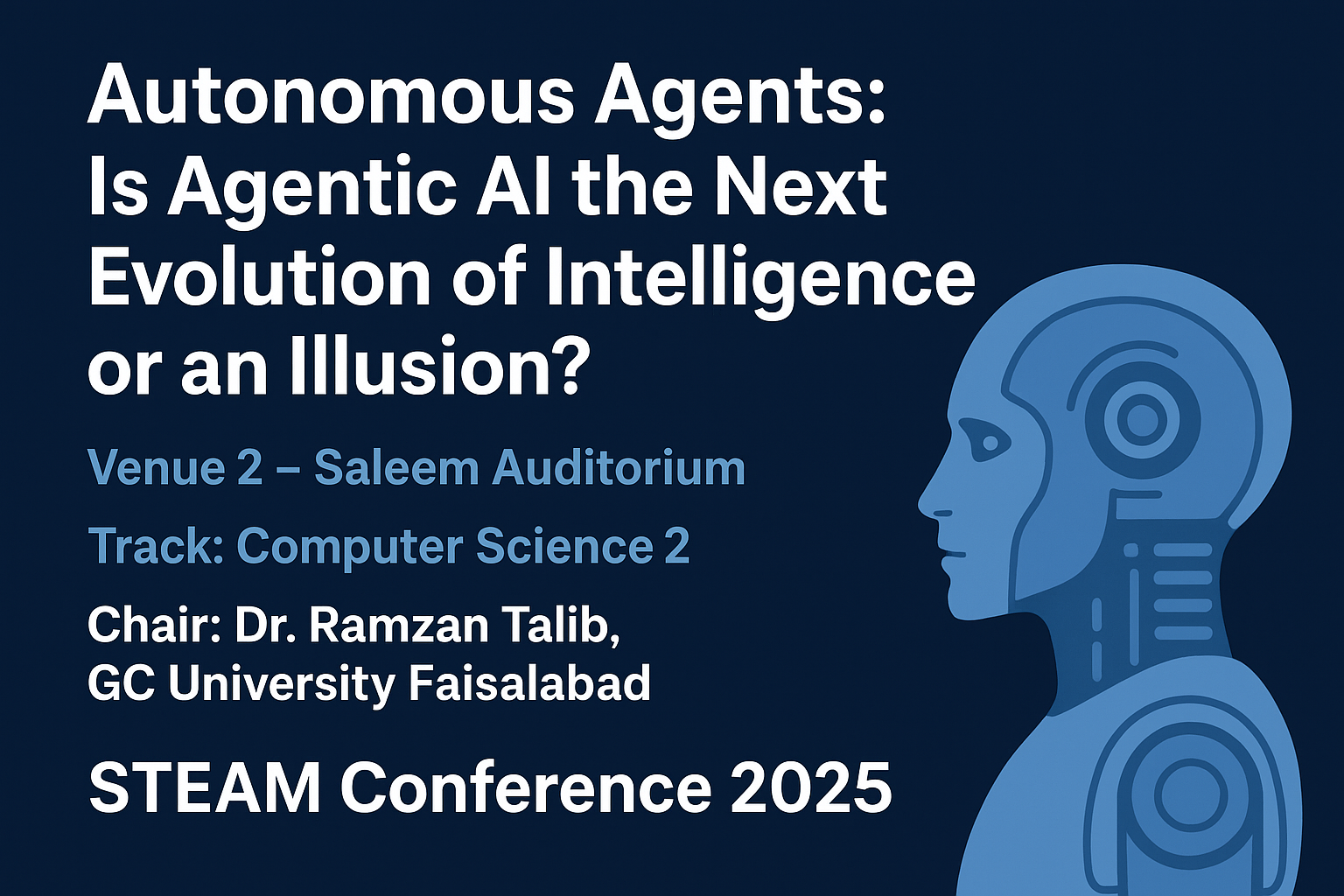Autonomous Agents: Is Agentic AI the Next Evolution of Intelligence or an Illusion?
Venue 2 – Saleem Auditorium
Track: Computer Science 2
Chair: Dr. Ramzan Talib, GC University Faisalabad
Co-Chair: Dr. Talha Farooq, The University of Faisalabad
Date: STEAM Conference 2025
Introduction
As artificial intelligence continues to move beyond traditional machine learning and deep learning, the global research community stands at a critical crossroads: Are autonomous, self-directed AI agents the next leap toward true machine intelligence—or merely a sophisticated illusion of autonomy? This profound question set the tone for a highly engaging session under the theme “Autonomous Agents and Agentic AI” during the STEAM Conference 2025, hosted at Saleem Auditorium within the Computer Science (2) track.
Led by Chair Dr. Ramzan Talib from GC University Faisalabad and Co-Chair Dr. Talha Farooq from The University of Faisalabad, the session brought together international scholars, technologists, and domain experts. Together, they explored how autonomous agents are reshaping industries, research ecosystems, and human–machine collaboration.
Dr. Talib opened the session by highlighting how autonomous agents—AI systems capable of self-planning, tool use, and multi-step reasoning—are rapidly transforming automation across education, healthcare, cybersecurity, and industrial analytics. Dr. Talha Farooq emphasized the responsibility of universities to develop ethical, transparent, and explainable agentic systems that align with both global innovation and local societal needs.
Keynote & Invited Talks That Shaped the Discussion
Exploring the Foundations of Agentic AI
Muhammad Azhar – Hong Kong Shue Yan University, SAR China
Azhar delivered an insightful talk on decentralized AI architectures and their role in enabling agent-driven automation. He explained how agentic AI models can independently analyze tasks, collaborate with other agents, and learn from distributed environments—pushing AI beyond passive prediction into active decision-making.
International Perspectives on AI, Science, and Automation
Impact of Mycotoxins on Global Food Security
Khalid Mahmood – National Yunlin University of Science & Technology, Taiwan
While not directly focused on agentic AI, Khalid Mahmood’s invited talk provided a scientific lens on how autonomous systems can support agriculture. He highlighted how AI agents can monitor fungal growth, detect contamination, and automate food safety management strategies—enabling proactive rather than reactive responses in supply chains.
STEAM Innovation for Modern Agriculture
Mithat Derik – Selcuk University, Turkiye
Derik emphasized the role of AI-powered agents in modern agricultural business models. From crop monitoring to yield prediction, STEAM-driven solutions integrated with autonomous systems can cultivate innovative, sustainable farming ecosystems across the world.
Photodegradation of PFAS Through Smart Modeling
Mustafa KAN – Ahi Evran University, Turkiye
Mustafa discussed advanced photodegradation techniques for harmful chemicals. His research opened pathways for AI agents to manage environmental data, simulate degradation processes, and support policymakers with scientific insights.
Biophilic Design Frameworks and AI Integration
Siti Nor Atika Baharin – Malaya University, Malaysia
Siti introduced a biophilic model for corporate buildings, emphasizing sustainability and human-centric design. She noted that autonomous agents can assist architects and planners in optimizing environmental factors, energy use, and workplace well-being.
Deep Learning, Healthcare, and Autonomous Intelligence
Human Activity Recognition Through Multimodal AI
Fizza Noor Hashmi – The University of Faisalabad
Fizza presented cutting-edge multimodal deep learning models capable of recognizing human actions. She demonstrated how integrating sensor data, vision, and behavioral patterns can create agentic systems ideal for robotics, elderly care, and smart surveillance.
Improving Lung Nodule Diagnosis
Farzan Majeed Noori – University of Oslo, Norway
Farzan discussed deep learning systems designed for early lung cancer detection. He emphasized how autonomous diagnostic agents can prioritize cases, support radiologists, and reduce healthcare delays.
Prompt Sensitivity in Multilingual LLMs
Amrozia Sundas – National Textile University Faisalabad
Amrozia explored how multilingual AI models respond differently to prompts. Her findings are crucial for building reliable autonomous agents, ensuring they behave consistently across languages and contexts.
Explainable AI for Legal Text Summarization
Mehran Hanif – The University of Faisalabad
Mehran showcased an explainable NLP system capable of summarizing complex legal documents. This research strengthens the foundation for legal tech agents that assist lawyers, judges, and policymakers with transparent recommendations.
LIME-Based Explainable Models for Digit Classification
Iram Hanif – The University of Faisalabad
Iram’s work demonstrated how explainable AI models can build trust in automated decision-making, a necessary element for deploying autonomous agents in education, finance, and security.
HARHIS: A Real-Time Adaptive Health Intelligence Agent
Mehak Rana – The University of Faisalabad
Mehak introduced an advanced Django-based multi-modal framework that uses AI agents to predict health risks and deliver adaptive interventions—bringing healthcare into a new era of real-time intelligence.
AI Agents in Virtual Education Systems
Muhammad Aamir Mahmood – Virtual University Pakistan
Aamir highlighted how AI agents can personalize e-learning, auto-assess student performance, and provide intelligent tutoring—reshaping the future of virtual education.
Is Agentic AI the Future—or an Illusion?
Throughout the talks, a central debate emerged:
Are autonomous agents truly intelligent, or do they only appear intelligent due to sophisticated pattern learning?
The session identified key challenges:
- Lack of consistent reasoning abilities across contexts
- Ethical risks of unsupervised autonomous actions
- Hidden biases that influence agentic decisions
- Over-reliance on LLM-generated reasoning
- Need for explainability and user control
Yet, the speakers agreed that despite limitations, agentic AI represents a powerful evolutionary step in AI’s journey—one that requires oversight, transparency, and global collaboration.
Conclusion
The session “Autonomous Agents: Evolution of Intelligence or Illusion?” proved to be one of the most intellectually stimulating events of the STEAM Conference 2025. Under the guidance of Dr. Ramzan Talib and Dr. Talha Farooq, researchers from Pakistan, China, Norway, Malaysia, Taiwan, and Turkiye presented diverse applications in healthcare, agriculture, design, environmental science, legal tech, and human–computer interaction.

